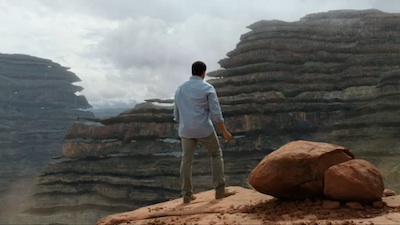THERE’S TOO MUCH TO SAY ABOUT LAST SUNDAY'S EPISODE OF COSMOS.
Steve Newton and I have shared Cosmos reviewing duties, and this week Neil deGrasse Tyson and his team served us an overflowing plate.
 We’re both Grand Canyon nerds (and we’ll be staffing NCSE’s annual rafting trip down the Canyon this summer), and Tyson started the show with a bang. He pulled apart the layers of the Canyon and showed the moments in Earth’s history that they preserve. The idea of stratigraphy, that the layers of the earth are pages in a history book, deserved more time, but Tyson’s brief exploration of the Grand Canyon was a memorable image and sure to shape how geology teachers present stratigraphy to their lucky students in the future.
We’re both Grand Canyon nerds (and we’ll be staffing NCSE’s annual rafting trip down the Canyon this summer), and Tyson started the show with a bang. He pulled apart the layers of the Canyon and showed the moments in Earth’s history that they preserve. The idea of stratigraphy, that the layers of the earth are pages in a history book, deserved more time, but Tyson’s brief exploration of the Grand Canyon was a memorable image and sure to shape how geology teachers present stratigraphy to their lucky students in the future.
Steve’s a geologist and wrote our FAQ on how we know the age of the Earth. This week’s episode of Cosmos explored how we came to learn the age of the Earth, focusing on Clair Patterson’s pioneering work using radioisotopes to figure out the age of meteorites, and thus the whole solar system (including Earth). The research Tyson describes, and the entire field that’s grown out of Patterson’s work, is constantly attacked by young-earth creationists. Tyson’s clear explanation of how we know the Earth is billions of years old will be a thorn in creationists’ sides for decades to come.
As an aficionado of science denial, I can’t believe I never connected this early work on the age of the Earth with the gasoline industry’s attempts at suppressing Patterson’s finding about the pervasive harm caused by leaded gasoline. The story of the battle against leaded gasoline is a bit more complicated than what the show tells (see, for instance, the discussion of leaded gasoline in the American Experience episode The Poisoner’s Handbook), but the basic structure of the story is not only accurate, but eerily familiar. Patterson’s attempts to measure the age of meteorites and Earth were hindered by widespread contamination of samples with lead residue from gasoline. Lead’s dangerous health effects had been known since Roman times, and the dangers of tetraethyl lead (the additive in gasoline) were known almost as soon as it was developed. The fact that burning leaded gasoline was spreading a neurotoxin across every surface, including food and water, was new, and alarmed him. He published those results, even though the research had been funded by the petroleum industry, and saw his funding cut off as a consequence. But he found new ways to support that research, and became one of the great advocates against lead additives in gasoline.
As David Michaels observes in Doubt Is Their Product, removing lead from gasoline resulted in 80% drops in lead levels in children’s blood, changes associated with a 2-5 IQ point increase. And as Kevin Drum has pointed out many times, it has reduced violent crime rates. The residual lead left behind in the soil after fifty years of leaded gasoline use is still affecting children today, especially in inner cities, disproportionately affecting minority communities.
The lead and petroleum industries helped write the playbook used by science deniers, a playbook also written by the tobacco industry in that same era (and later refined by the industries responsible for acid rain, ozone depletion, and climate change, not to mention the NFL, and co-written or converged-upon by creationists). They obscured evidence that their product caused harm. They funded researchers to muddy the waters, generating papers that made it seem like there are two sides to the story when there aren't. And they twisted the political process to enable them to do so. All in the service of generating profits while poisoning our food, water, and air—and dulling the minds of the world’s children.

